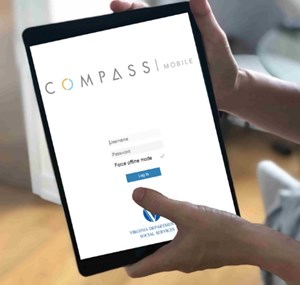Case-supportive Technology
The Virginia Department of Social Services (VDSS) and the QIC-WD designed a multi-phase case-supportive technology intervention to help child welfare caseworkers complete their case notes and other administrative tasks required as part of their job. The decision by VDSS to implement technological supports for caseworkers was informed by two data collection efforts:
1. Listening sessions, held by VDSS staff in each region of the state, and
2. Exit survey results from all 120 local departments of social services (LDSS).
These data collection efforts found that the biggest complaint among caseworkers, particularly those leaving their jobs, was the lack of technological supports and flexibility to help them complete job tasks more quickly. (For more information on the participating LDSS, see the Site Overview).
 Two technology innovations made up the Virginia intervention:
Two technology innovations made up the Virginia intervention:
- Transcription services became available beginning in late fall 2017, early winter 2018 to all caseworkers who managed caseloads in child welfare and adult protective services in Virginia. The transcription services allowed caseworkers to dictate notes from their case visits via telephone to a company called FlexDictate, which is available 24 hours a day, 365 days per year. The transcribed notes were returned to the caseworker by email within a short window of time (e.g., 1 to 5 days depending on the length of the document). The caseworker, through a secure website, copied the transcribed notes and placed them into the electronic case record system. The QIC-WD worked closely with 18 diverse LDSS (in terms of location in the state, size of the locality, and workforce policies) as a subsample of participating localities to conduct an evaluation of the impact on worker productivity, feelings, and outcomes.
- COMPASS|Mobile, a mobile application (app) developed by RedMane connected to the case management system, was rolled out between October 2019 and January 2020, and was available to all caseworkers who manage caseloads in child welfare. The app was placed on iPads provided to the caseworkers. COMPASS|Mobile can be used in both online and offline mode to enter new case contacts, intakes and investigations (I&Is), read the last 90 days of contacts/I&Is, access and update demographics, educational information and medical information, upload photos, access policy manuals and job aids, view placement providers, complete forms, obtain digital signatures, and share forms through encrypted email. Supervisors can oversee casework through a parallel computer-based portal.
 The goals of the intervention were to:
The goals of the intervention were to:
- Utilize technology to facilitate case management and real-time reporting
- Provide staff the flexibility in how, when, and where casework was completed
- Enhance efficiency and accuracy of case documentation
- Decrease the amount of time spent on administrative tasks
- Increase the amount of time spent with families
- Reduce staff stress
- Increase job satisfaction
- Reduce attrition
Since the initial rollout of COMPASS|Mobile, VDSS has launched additional features including:
- An audio application that allowed caseworkers to securely record their investigative interviews and eliminated the need to carry additional recording devices.
- A family messaging feature that provided opportunities to increase family engagement. The messages were shared via encrypted email through the COMPASS|Mobile app.
- A check-in feature that allowed frontline caseworkers the ability to check-in when engaged in work related travel. They can check-in when they leave for their destination, arrive at their destination, and depart from their destination and the app will notify their supervisor via email of their arrivals/departures.
- The in-home prevention service plan feature which promoted plan completion while engaging with families and allowed for electronic signatures in real time. Permanency caseworkers can view their case plans with their families on the COMPASS|Mobile app to enhance service delivery and engagement with families.
- The structured decision-making tools (risk assessment, risk reassessment, safety assessment, family strengths and needs assessment, and family reunification review tools) which supports increased family engagement and accuracy in completion of the assessments.
- The Genogram feature which promoted capturing meaningful and critical information on relatives in a secure platform that can be shared via encrypted email.
In response to the COVID pandemic, VDSS was able to utilize COMPASS|Mobile to deploy critical resources to LDSS by adding a COVID icon which could be accessed without Wi-Fi or virtual private network connections. The COVID icon allowed VDSS to upload important broadcasts, memos, documents, and job aids related to COVID. In addition, COMPASS|Mobile was utilized for doxy.me, a HIPPA and HITECH compliant virtual platform, which was used for virtual face-to-face visits and virtual meetings with families to ensure child, family, and staff safety. This platform allowed LDSS to meet federal requirements for contacts with families and children during the pandemic.